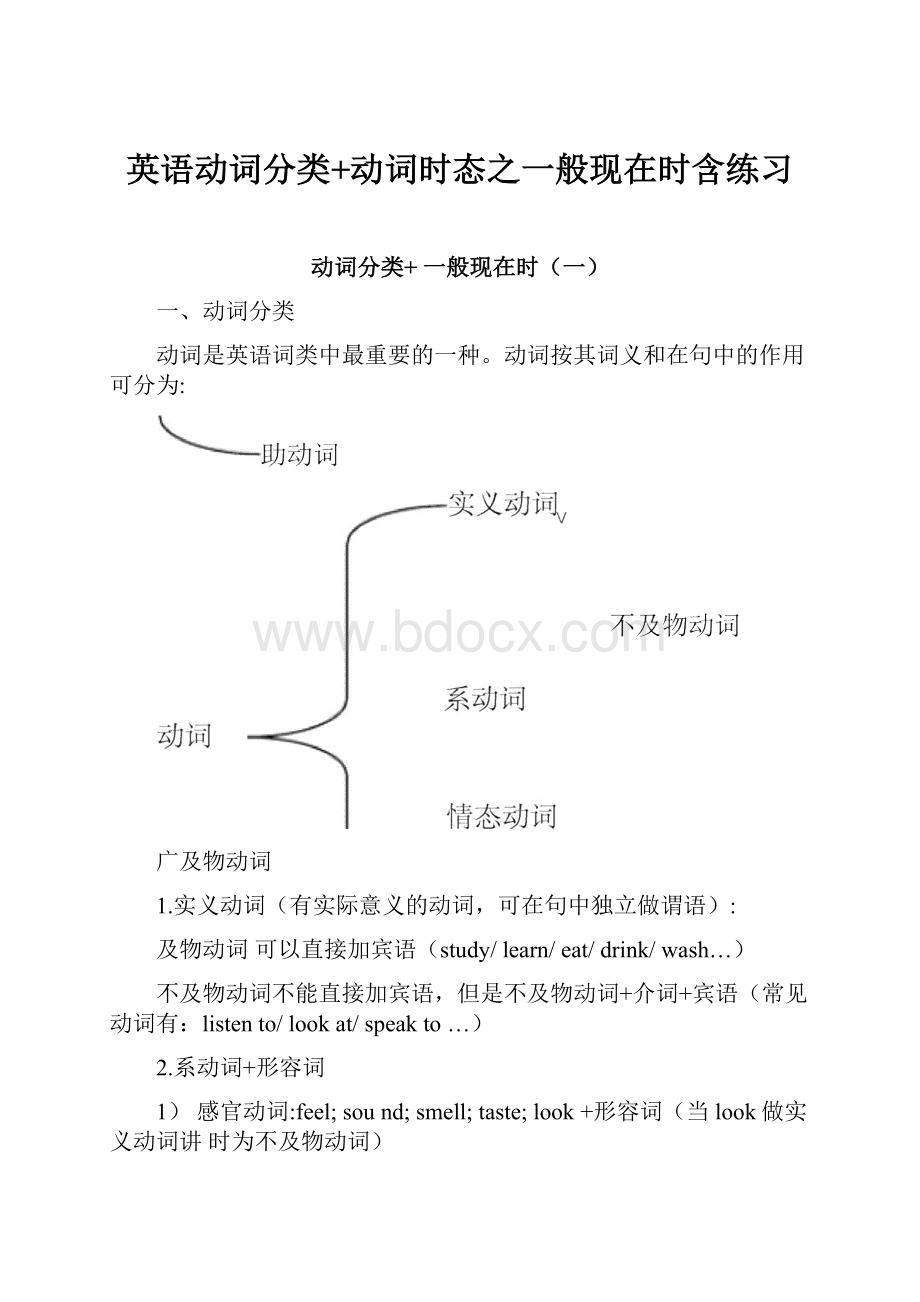英语动词分类+动词时态之一般现在时含练习.docx
《英语动词分类+动词时态之一般现在时含练习.docx》由会员分享,可在线阅读,更多相关《英语动词分类+动词时态之一般现在时含练习.docx(13页珍藏版)》请在冰豆网上搜索。

英语动词分类+动词时态之一般现在时含练习
动词分类+一般现在时
(一)
一、动词分类
动词是英语词类中最重要的一种。
动词按其词义和在句中的作用可分为:
广及物动词
1.实义动词(有实际意义的动词,可在句中独立做谓语):
及物动词可以直接加宾语(study/learn/eat/drink/wash…)
不及物动词不能直接加宾语,但是不及物动词+介词+宾语(常见动词有:
listento/lookat/speakto…)
2.系动词+形容词
1)感官动词:
feel;sound;smell;taste;look+形容词(当look做实义动词讲时为不及物动词)
2)be/seem+形容词
3)表变化的词:
get/turn/become/go+形容词(get/turn/go当实义动词讲是意思分别为:
得到/轮流/去、走)
3.助动词无实际意义,在句中不能独立做谓语,have/do既可以做助动词也可
以做实义动词(先做简单了解,之后讲动词时态时会经常见到)
eg1.Ihaveabike.(have是实义动词)
eg2.TheyhavegonetoBeijing.(have是助动词)
eg3.Idomyhomeworkeveryday.(do是实义动词)
eg4.IdolikeEnglish.(do是助动词)
4.情态动词(情态动词在句中不可独立做谓语
常见情态动词:
may,might,can,could,must,shall,should,will,would,hadbetter,neec(此处不做重点,之后会做情态动词专题)
般现在时的用法
1.基本用法
表示经常的或习惯性的动作,常与表示频度的副词:
always、usually、often、sometimesseldom、never等以及时间状语:
everyday、everymorning、everyafternooneveryevening等连用。
Eg:
Heoftengoesswimminginsummer.
Iusuallygotoschoolat7everymorning.
2.拓展用法
1表示现在的状态。
Eg:
Myfatherisatwork.Heisverybusy.
Theboyistwelve.
2表示主语具备的性格、特征和能力等。
Eg:
Mysisterisveryclever.
Ilikesinging,butIcan'tsingverywell.
3表示客观真理,客观存在,自然现象。
Eg:
Theearthmovesaroundthesun.
ShanghailiesintheeastofChina.
4表示按计划或安排好的,或将要发生的动作,可用一般现在时表将来。
但只限于start,begin,leave,go,come,arrive,return等。
Eg:
Thetrainleavesatsixtomorrowmorning.
5在时间、条件状语从句中,用一般现在时表示将来时的动作。
Eg:
Ifiddoesn'traintomorrow,we'llgotothepark.
三.一般现在时的结构
㈠含Be动词的一般现在时的结构
肯定句:
主语+am/is/are+其他成分.(注意be动词的选取)
否定句:
主语+am/is/are+not+其他成分.
一般疑问句:
Am/Is/Are+主语+其他成分?
(注意疑问句的回答)
Eg:
Iamastudent./Sheisateacher./Wearedoctors.
Iamnotastudent./Sheisnotateacher./Wearenotdoctors.
Areyouastudent?
/Issheateacher?
/Areyoudoctors?
注意主语是第
人称代词在疑问句中的变化)
㈡含实义动词的一般现在时的结构
1.动词第三人称单数形式的变化规则
规则
动词原形
第三人称单数形式
一般在词尾加-S,(清辅音后
play
plays
读/,S在浊辅音后读/;在t
leave
leaves
后读/t在/d,后读/d。
)
swim
swims
以字母s,x,ch,sh,o结尾
pass
passes
的词加-es,读/iz如果动词
fix
fixes
原形词尾已有e,则只加-s。
teach
teaches
wish
wishes
do
does
以辅音字母加y结尾的词,
study
studies
先变y为i,再加-es,读/。
/
carry
carries
(元y结尾直接加s)
fly
flies
特殊:
have的单数形式是has
2.基本结构
1当主语是I,you,we,they等代词及表示复数概念的名词做主语时:
肯定句:
主语+动词原形+其他成分•
否定句:
主语+don't+动词原形+其他成分.
一般疑问句:
Do+主语+动词原形+其他成分?
(注意疑问句的回答)
Eg:
Theystudyveryhard.
Theydon'tstudyveryhard.
Dotheystudyveryhard?
2当主语是she,he,it等代词及表示单数概念的名词作主语时:
肯定句:
主语+动词的第三人称单数+其他成分.
否定句:
主语+doesn't+动词原形+其他成分.
一般疑问句:
Does+主语+动词原形+其他成分?
(注意疑问句的回答)
Eg:
Shegetsupat6o'clockeverymorning.
Shedoesn'tgetupat6o'clockeverymorning.
Doesshegetupat6o'clockeverymorning?
课堂练习:
一、写出下列动词的第三人称单数
1.eat
grow
see
open
wear
2.push
wash
pass
fix
watch
catch
go
do
3.try
fly
carry
worry
cry
Studyhurry
4.saystayplay
5.havebe
二、用所给动词的一般现在时填空。
1.Peter(go)toschooleveryday.He(study)veryhard.
2.Themoonalways(move)aroundtheearth.
3.youoften(water)theseflowers?
4.They(be)doctors.They(nothave)aholidayonSundays.
5.Mary(do)herhomeworkafterschool.She(notwatch)TV.
6.Shesometimes(singanddance)happily.
三、用be动词或do的适当形式填空。
1.---yourteachersworkhard?
---Yes,they.
2.---Whattheyeveryday?
---Theytheirhomework.
3.---theboyclever?
---Yes,he.Hehishomeworkbyhimself.
4.---Itallandhandsome?
---Yes,you.
5.——Howoftenshecombherhair?
---Shecombsherhairtwiceaday.
四、单选选择。
1.---hetotheparkat6:
30inthemorning?
---No,he.
A.Does;goes;doesB.Does;go;doesn'C.Does;go;does
2.Sheusuallyherfriends.Theyoftentea.
A.see;drinkB.sees;drinksC.sees;drink
3.---yourpen--paldiving?
---No,he.Hewritingstories.
A.Does;like;doesn't;likeB.Does;likes;doesn't;like
C.Do;like;don't;likes
4.---youcoffee?
---Yes,I.
A.Do;like;doB.Did;like;didC.Are;like;am
5.Shetea,buthe.
A.likes;doesn'tB.like;don'tC.like;doesn't
课后练习:
I.写出下列动词的第三人称单数形式
1.play
4.drink
2.fly
5.play
3.plant
6.go
7.make
8.do
9.dance
10.worry
11.ask
12.taste
13.eat
14.draw
15.put
16.throw
17.say
18.pass
19.come
20.sit
II.按要求改写句子。
1.Itissunnytoday.
否定句:
一般疑问句:
肯定、否定回答:
2.Allthestudentslikesinging.
否定句:
一般疑问句:
肯定、否定回答:
3.Wecansinganddance.
否定句:
一般疑问句:
肯定、否定回答:
4.JohncomesfromCanada.
否定句:
一般疑问句:
肯定、否定回答:
III单选选择。
1.Jennyinanoffice.Herparentsinahospital.
A.work;worksB.works;work
C.work;areworkingD.isworking;work
2.Oneoftheboysablackhat.
A.haveB.thereisC.thereareD.has
3.Hesaidthesunintheeastandinthewest.
A.rose;setB.rises;setsC.rises,setD.rise;sets
4.WangMeimusicandoftentomusic.
A.like;listenB.likes;listensC.like;arelistening.D.liking;listen
5.JennyEnglisheveryevening.
A.hasstudyB.studiesC.studyD.studied
一般现在时
(二)
㈢含情态动词的一般现在时的结构(此时动词只能用动词原形,不受其他的
影响)
肯定句:
主语+情态动词+动词原形+其他成分•
否定句:
主语+情态动词+not+动词原形+其他成分.
一般疑问句:
情态动词+主语+动词原形+其他成分?
Eg:
Theymustcleantheclassroomeveryday.
Theyneedn'tcleantheclassroomeveryday.
Musttheycleantheclassroomeveryday?
四•拓展知识点归纳
在一般现在时句
子中,通常会有一些表示频度的副词及短语,该如何抉择呢?
1.频度副词的程度
always>usually>often>sometimes>seldom>never
(注意sometimes/sometimes/sometime/sometime的区另)
2.表示频度的短语的构成
①由“次数+a+时间范围”构成
Eg:
once/twiceaday/week/month/year
②由“every+表时间的名词”构成
Eg:
everyday/week/month/year
以上两种频度短语都可以用于回答以howoften提问的问句
3.频度副词或短语的位置
频度副词通常放在be动词和情态动词的后面,实义动词的前面
Eg:
Shealwaysgetstoschoolontime.
Sheisneverlateforschool.
Shecanalwaysremembereverythingclearly.
课堂练习:
一、用适当的词填空。
1.JennyandDannyusually(play)gamesintheafternoon.
2.yoursister(know)English?
3.Herhome远离)herschool.
4.Thepot(壶)(notlook)likeyoursverymuch.
5.Whereyou(have)luncheveryday?
6.Who想要)togoswimming?
7.she(do)thehouseworkeveryday?
8.Mybrother(speak)Englishverywell.
9.(be)yoursisteramemberoftheReadingClub?
10.Myparents(donot)(like)playingbadminton.
11.We(wear)blueschooluniforms.
12.Onweekends,theGreens(go)outtoeat.
13.Thebabyoften(cry)atnight.
14.Kittyisagoodstudent.She(work)hard.
15.
Herdaughter(wash)thedishesafterdinnereveryevening.
1.Hetheradioeverymorning.
D.hearsof
A.listenstoB.listenC.hears
2.Mysistermusicverymuch.She'slisteningtoanewsongnow.
A.likeB.likesC.likedD.isliking
3.Lindaoftenherhomeworkintheevening,butthiseveningshe
TV
B.isdoing;watches
D.isdoing;iswatching
A.does;watches
C.does;iswatching
4.Weusuallyhavesixlessonsaday,andeachofthem45minutes.
A.lastB.lastsC.haveD.need
5.TheyusuallyTVintheevening.
A.watchB.willwatchC.arewatchingD.watches
6.Healwaysgetsupearlyandhisclothesquicklyinthemorning.
A.dressesB.putsonC.wearsD.hason
7.---Hecameearlythismorning,didn'the?
---Yes,hedid.Heoftentoschoolearly.
A.comeB.comesC.cameD.hascome
8.Thefloweroftensweet.
A.issmellingB.smeltC.issmeltD.smells
9.Theearthroundthesun.
A.movingB.movesC.movedD.move
10.Itmeaboutaquartertogotoschoolonfooteveryday.
A.paysB.spendsC.costsD.Takes
课后练习:
I.单项选择。
1.Whenyourmothergetupeverymorning?
A.doB.didC.doesD.doing
2.Jimisalazyboy.Hestudyhard.
A.don'tB.doesn'tC.aren'tD.isn't
3.---youandyoursistertothesameschool?
---No,wedon'Herschoolisfarawayfrommine.
A.Does;goB.so.goesC.Dose;goesD.Do,go
4.---thegirlgoodatplayingbadminton?
---Yes,she.
A.Does;doesB.Is;isC.Does;isD.Is;does
5.Annishelpful.She'shappytohelpothers.
A.sometimesB.seldomC.neverD.always
II.句型转换。
1.HisfatherisanEnglishteacher.
否定句:
一般疑问句:
肯定回答:
否定回答:
2.Thesecatsarecrying.
否定句:
一般疑问句:
肯定回答:
否定回答:
3.Theycanswim.
否定句:
一般疑问句:
肯定回答:
否定回答:
4.IliketoreadEnglish.
否定句:
一般疑问句:
肯定回答:
否定回答:
5.Igotoschoolonfoot.
否定句:
一般疑问句:
肯定回答:
否定回答:
6.HelikesEnglish.
否定句:
一般疑问句:
肯定回答:
否定回答:
7.Hisfathergoestoschoolbybus.
否定句:
一般疑问句:
肯定回答:
否定回答:
8.Shewantsacupofcoffee.
否定句:
一般疑问句:
肯定回答:
否定回答:
9.HisbirthdayisNovember2(0h.
否定句:
一般疑问句:
肯定回答:
否定回答: